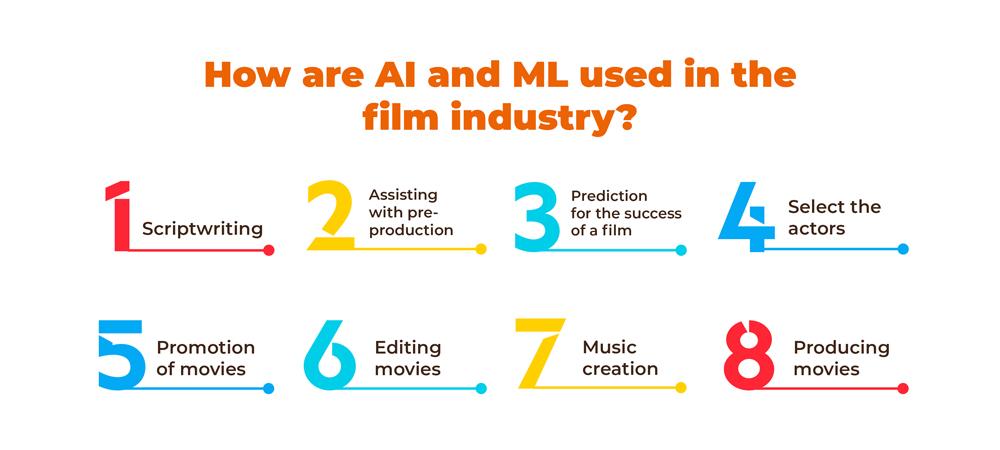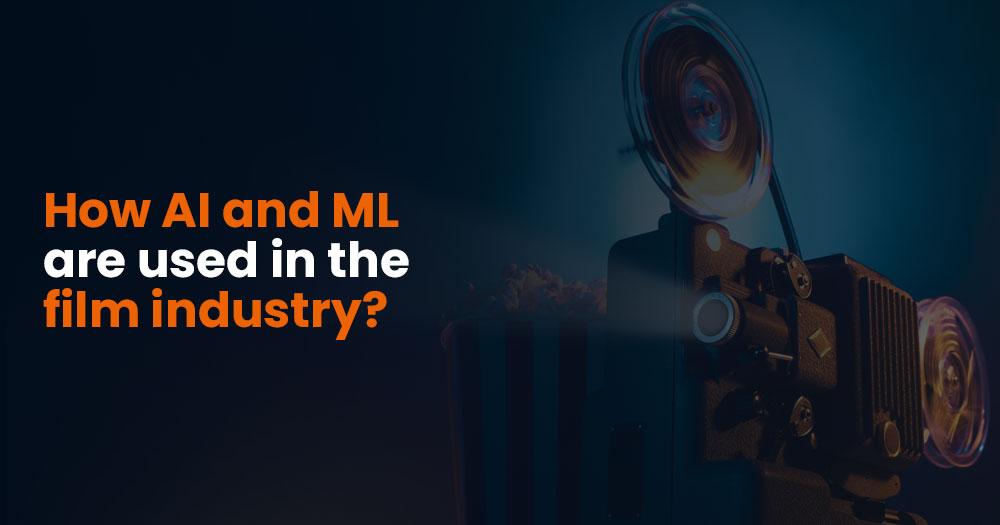Introduction
Film industries across the globe have been progressively investing in and experimenting with novel technologies such as Artificial Intelligence (AI) during the past decade. Algorithms based on AI and ML are used in the film industry and have helped in completing film-related tasks swiftly and at scale in real time. These new-age technologies, when used effectively, produce some of the best editing, high-definition graphics, and visual effects available today.
Since its inception in late 2010, movies have always been a medium to bring people’s imagination alive. Today, cinema has evolved into a medium of joy and happiness providing people with an opportunity for a two-hour getaway from real-life challenges. Almost every country on the planet has its film industry. While Hollywood is beloved by audiences for its ability to produce high-quality films using cutting-edge technology, Bollywood is riding on the emotional connection and garnering global traction with strong storylines and unique storytelling representing the Indian culture. From computer-generated visual effects to employing highly skilled professionals and deploying state-of-the-art equipment to produce breathtaking movies, filmmaking today has also evolved for the better.
Ever watched a movie written by Artificial Intelligence and animated by a deep learning algorithm? Sounds fantastic, no? But the reality is AI has already been integrated into many aspects of the film industry for predicting the success of movies, writing scripts, designing graphics, selecting the cast, and even promoting film projects in which AI and ML are used in the film industry.
How are AI and ML used in the film industry?

Scriptwriting
Choosing the script that will gain impact and will generate revenues is essential. Using AI to create new scripts may assist filmmakers in dealing with this task more effectively. Being fed massive amounts of data in the form of movie scripts, machine learning algorithms analyze the data, learn from them, and develop unique scripts. This creates the procedure much faster and saves crucial time and resources for filmmakers.
May also use Artificial Intelligence to analyze scripts that w will make into a film. AI algorithms can study the scripted storyline, bringing forward possible questions, uncertainties, and suggestions, thus making the process of script analysis much simpler and faster.
Assisting with Pre-production
AI has great potential to simplify the pre-production process by helping to plan schedules, find locations that best fit the storylines, and support other preparatory processes. Implementing AI will automate the planning of shooting schedules according to the availability of actors, which will save time and increase efficiency. In addition, AI systems can analyze the locations described in the screenplays and recommend actual sites for shooting the scene, saving lots of resources in location scouting. AI can assist in streamlining the procedure, including in pre-production. For example, AI can assist in finding out the best locations for particular shoots and other pre-production tasks. It can analyze the dates available for various actors and plan the schedule accordingly. Thus, we can arrange the film shoot schedule to make sure maximum efficiency. As we can use AI technology to understand scripts and screenplays, we can use it to recognize the locations described in them. It can suggest real-world places where directors can visit and shoot the scene. The technology saves up time spent searching for sites and in principal photography.
Additionally, c can leverage the technology for purposes. AI can assist producers, and casting directors choose the correct actors. c can also use AI algorithms to analyze the past performances of actors. It can analyze the regions where their movies were a hit and the actors have a huge fan following. Producers can then plan their promotions and marketing campaigns accordingly.
Prediction for The Success of a Film
You may also use AI to analyze a film’s script to predict the revenues the film will earn. However, the algorithmic predictions are only sometimes proven completely accurate; they’re already attracting growth of interest from leading film studios. For example, Warner Bros. has turned to a Cinelytic AI-based platform for predicting the success of its movies and box office receipts. 20th Century Fox has been integrating the Merlin system that uses AI and machine learning to match up movies to specific genres and audiences and give complete demographics for any movie. ScriptBook is another AI-based film prediction system that Sony Pictures uses to analyze 62 of its movies.
Select the Actors
AI solutions can also speed up casting actors by automatically performing auditions. According to the specified criteria and textual image descriptions, AI platforms search for actors in the database. When fed with vast amounts of data that describe the facial features of actors in various emotions, the algorithm can be used to overlay the actor’s digital face on a body double to retain the natural expressions of the original performer. In this way, m may also assist AI in adding actors in films in digital form in various emotions and even de-age actors for the specified roles. Filmmakers may also have the advantage of applying AI to make multiple digital characters, such as the fictional supervillain Thanos for Avengers: Infinity War which was designed using machine learning.
Promotion of movies
Film studios have been using AI for efficient advertising and promotion. Analyze different factors such as audience base and actors’ popularity across the globe; film studios may plan their campaigns according to specific locations where they expect the maximum interest from the audience. For example, 20th Century Fox has been developing the Merlin Video neural network to predict the success of promotional videos. The film studio has also used IBM’s supercomputer to create the movie Morgan’s advertising clip.
Editing movies
Can leverage movie editors’ Artificial Intelligence to make trailers for films. AI systems can identify high-action and emotional movie scenes and bring them out to assist the editors in making enticing trailers. A real-life example of AI in movie editing is the IBM Watson program used to create a trailer for the science fiction film “Morgan.” AI can also be the best for full-length editing movies. The AI algorithm uses facial recognition to determine the main characters and scenes involving the main plotline. It can assist the editors in the processing of editing full-length feature movies.
Music creation
AI-based music composing tools are becoming a reality, and at some point, m may also use them for creating music compositions for films. Using the reinforcement technique, AI can analyze data from various designs and develop music patterns that adapt to the movie environment, depending on the movie genre and expected situations. Many tech companies use Artificial Intelligence technologies to create systems that can learn various music styles from an extensive database of songs and create new music. For example, the Japanese tech giant Sony used an AI program called Flow Machines to make an AI song in the style of the Beatles. Though there is still a bit of scepticism going around AI-generated music, at least AI can support humans in making original compositions, some of which may be used in distinctive movie scenarios.
Producing movies
Last but not least – Artificial Intelligence can also make movies. Benjamin AI made the science fiction movie “Zone Out” in 48 hours in collaboration with Ross Goodwin. Though the film didn’t win any awards, it’s still a great and challenging experience and a step forward in the automation of video creation with the intelligent use of AI technology.
With various innovative applications across moviemaking, AI brought many advantages to the film industry, including improving the overall filmmaking process, saving time and resources, and generating higher revenues.
You may also like to read: Use of Artificial intelligence (AI) in Transportation with Pros and Cons
How has technology changed the film industry?
It is great to watch how technology transforms the film industry, where almost any aspect of the moviemaking process is touched by technology. Advances in editing and recording software, 4k and 3D movie technology, drones, and AI-based screenplay writing tools have significantly impacted moviemaking. Visual technologies, more innovative movie-watching experiences, improved sound effects, new screening interfaces, and modern editing tools produce a never-before-seen movie experience.
The advantage of Artificial Intelligence has opened up even more innovative applications throughout the industry, along with many benefits it delivers for the world of moviemaking. With the potential for assisting humans with automated and data-driven decisions, AI can streamline the filmmaking process, enabling businesses to increase the efficiency of operations, reduce labour costs and generate more revenue.


